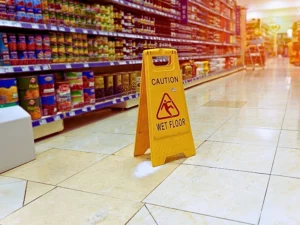There are several common causes of elevator accident lawsuits, including negligent maintenance, exceeding elevators’ capacity, and system malfunctions. Determining the cause of an elevator accident could help determine who was liable for any injuries and other damages sustained.
To file an elevator accident lawsuit in Las Vegas, call George Bochanis Injury Law Offices at 702-388-2005 for a free consultation with an elevator accident attorney.
The Most Common Causes of Elevator Accident Lawsuits
Elevator accidents often occur in the U.S., especially in cities like Las Vegas, where many high-rises have elevators. According to one study, the U.S. alone observes around 17,000 injuries and 30 deaths each year resulting from elevator-related accidents.
Oftentimes, a negligent party is responsible for elevator accidents and damages, depending on the specific cause of the accident.
The following are some of the most frequent reasons for elevator accidents:
Negligent Maintenance and Inspections
One of the most common causes of elevator accident lawsuits is inadequate maintenance or inspections. Elevators need to undergo regular maintenance and routine inspections to keep them in working condition, especially when experiencing frequent use.
Hotels and other facilities must have maintenance professionals inspect elevators for wear and tear, performing repairs or replacements as needed to prevent breakdowns. If property owners or maintenance professionals fail to properly inspect or maintain elevators, they may be liable for resulting accidents.
Overcrowding and Weight Limit Violations
Sometimes, passengers inadvertently cause elevators to fail due to overcrowding. In some cases, property management may be liable for accidents resulting from this cause if they fail to post signage indicating the maximum weight limit or number of passengers.
In other cases, passengers could ignore such postings and willfully exceed the weight or passenger limit, often due to impatience when unwilling to wait for another emptier elevator.
Malfunctioning Doors and Entrapment
Another cause of elevator accidents is malfunctioning doors, which could cause the doors to open or close at the wrong time and present a falling or crushing risk. Passengers could step out thinking that they’ve reached their floor, or the door may not close in time to safely contain all passengers when moving to another floor.
In some instances, doors may not open entirely, trapping people in elevators, or the elevator may become stuck and subsequently cause entrapment.
Regular maintenance and inspections could help prevent these accidents. If facilities fail to maintain and inspect elevator doors and ensure effective operation, management or maintenance personnel could be liable for accidents and injuries resulting from door malfunctions or entrapment.
Facility managers must have protocols in place to help passengers evacuate in the event of entrapment.
Types of Elevator Accidents
The aforementioned causes could cause a number of types of elevator accidents. These include:
- Falling Accidents: Elevators could fall if they exceed their weight limit, which is why it’s necessary to have signage indicating the weight or passenger limit. In other cases, passengers could fall from an elevator if the doors open at the wrong time between floors.
- Crushing Accidents: Various crushing accidents may also occur in elevators and doorways. For example, door sensors may not detect a person and close in on passengers when attempting to enter or leave the elevator at the last minute. Fatal injuries can also occur when passengers become trapped between a floor and the elevator as the elevator moves up or down.
- Tripping Accidents: Elevators must be consistently aligned with each floor, with most not allowing for anything exceeding a 0.5-inch height difference between the elevator and floor. Otherwise, misaligned elevators and flooring could cause passengers to trip when entering or exiting the elevator.
- Snagging Accidents: Additionally, elevators must not exceed 1.25 inches in distance from the floor, as sufficient distance could cause clothing or other items to become stuck between the elevator and the floor, which can result in trip-and-fall injuries or, in more serious situations, entrapment and crushing risks.
Each of these accidents can cause serious injuries or fatalities, warranting compensation if one or more negligent parties were responsible for them.
What to Do Following an Elevator Accident in Las Vegas
If an elevator accident occurs, there are critical steps to take to increase your chances of succeeding with a case. These action items include:
Seeking Medical Attention
Following an elevator accident, even if you don’t suspect serious injury, you should consult a medical professional. A licensed physician can assess your injuries and diagnose any condition you may have developed, providing you with a path to treatment.
Seeing a doctor will also help you prove that an injury resulted directly from the elevator accident, along with the extent of your injuries. Medical records are among the main items to include in your personal injury case checklist.
Contact the Authorities
Calling the authorities can help get immediate treatment to victims with serious injuries at the scene of the accident. Even if you don’t require immediate treatment for any injuries sustained, you should still call 9-1-1 and get the police involved.
The police can draft a detailed police report that includes an official narrative of the accident and how it occurred. Like medical records, this report could serve as an invaluable piece of evidence in a personal injury case.
Collect as Much Evidence as Possible
You should also gather sufficient evidence to prove injuries and more or less common causes of elevator accidents. The more evidence you have, the stronger your case can be as this evidence supports your claims.
Some examples of the evidence you could use in these cases include:
- Medical records and bills detailing injuries
- Police reports
- Proof of lost income
- Surveillance footage in and around the elevator
- Maintenance records detailing the elevator’s history of maintenance and inspections
Consult an Elevator Accident Attorney
Before pursuing a case, it’s best to consult an experienced elevator accident lawyer in Las Vegas to discuss your claim or lawsuit. A lawyer will have the knowledge and skills to help you navigate the claims or legal process to recover total compensation.
Why Hire a Personal Injury Lawyer After an Elevator Accident?
If you’re considering filing an elevator accident lawsuit, you might wonder when to hire a personal injury lawyer. These cases can be challenging to navigate, especially when defective elevator components and other issues can make it difficult to prove negligence.
Here are some of the main reasons to hire a lawyer for elevator accident claims or lawsuits:
Help Calculating Compensation
One of the main ways an attorney can help is by determining how much compensation you’re able to recover. He or she can review the details of your case and identify all damages.
There are a few main types of damages you may recover in these cases, including economic, non-economic, punitive, or wrongful death damages. While there isn’t an average settlement for elevator accident claims because of the many factors involved, your lawyer could give you an early indication of what your case is worth based on all damages involved.
Economic damages refer to medical bills and all other direct financial losses resulting from elevator accident injuries. Meanwhile, non-economic damages apply to pain and suffering, mental anguish, and other personal losses. In the event of a victim’s death following an accident, the decedent’s loved ones may be able to recover burial expenses and other wrongful death damages. Additionally, victims may be able to recover punitive damages in a trial setting if a party’s gross negligence or malicious intent caused an accident.
Gathering Evidence
Another way a personal injury attorney can benefit you is by collecting and organizing evidence to support your case.
Attorneys can reach out to medical professionals, police departments, witnesses, and other parties to gather strong evidence that can indicate the cause of the accident and the nature of your injuries.
Negotiating Claims
Even the most common elevator accident lawsuits tend to settle during the claims process with insurers before going to trial. A lawyer can help you negotiate with insurers to successfully file a claim, navigating the process to make counteroffers to initial offers and ensuring you’re able to reach a favorable settlement based on your case’s total value.
Taking Your Case to Court
Sometimes, personal injury cases go to trial if they don’t settle during negotiations. In these instances, it’s important to have an attorney with trial experience backing your case. A trial lawyer can represent you during your lawsuit to present opening and closing arguments while guiding you through the entire legal process.
Knowing the common causes of elevator accident lawsuits could ultimately help you identify the liable parties in an elevator accident case, and a lawyer can go a long way in helping you build your case.
For help with your case, contact us today at George Bochanis Injury Law Offices and schedule an initial consultation with one of our Las Vegas elevator accident lawyers.





